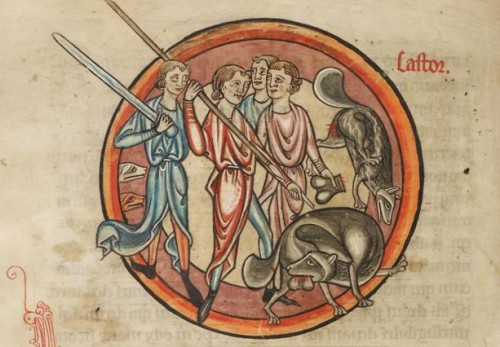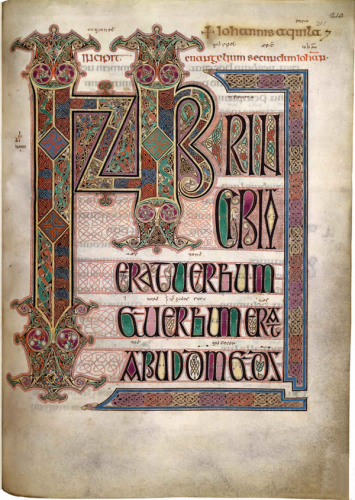As many a scholar has shown, medieval thinkers put great stock in names. And the etymology of a name was itself considered a legitimate source of information about the thing described. After all, had not God revealed that “in the beginning was the Word“? ((John 1.1: “In principio erat Verbum, et Verbum erat apud Deum et Deus erat Verbum.” In Latin, the way the words mirror each other, the phrase looping back on itself, only reinforces the apparent importance of words themselves.)) Thus one of the more popular works of the medieval period was Isadore of Seville’s Etymologiae, an encyclopedic compendium of facts and trivia meant to be, essentially, the summa of all summa. Book I of his universal codex, “De grammatica” (On Grammar), begins thus: ((Taken from the Barney edition.))
Concerning Discipline and art: 1. A discipline (disciplina) takes its name from ‘learning’ (discere), whence it can also be called ‘knowledge’ (scientia). Now ‘know’ (scire) is named from ‘learn’ (discere), because none of us knows unless we have learned. A discipline is so named another way, because ‘the full thing is learned’ (discitur plena). 2. And an art (ars, gen. artis) is so called because it consists of strict (artus) precepts and rules.
Isadore’s method is not far removed from that of many contemporary amateur Arthurians, truth be told. You just squint at a word long enough until you realize that it kind of looks like another word. Of course, nearly everything Isadore says is wrong. ((Also like the amateur Arthurians.)) Art comes from artis, meaning strict? Check the OED, Izzy, and you’ll find that art comes from the same Indo-European base as the ancient Greek ἀραρίσκειν, or “to fit together”, as in the way that dovetails carved in wood fit together. And discipline does come from “to know”, ((But the plena = pline part, that’s just squinting.)) but by way of the Latin discipulus, student, and discipulina, both of which overlap not just with knowledge but with the money you have to pay tutors to give it to you–not just knowledge, but also tuition. So Isadore’s very first paragraph has it almost completely backwards! These words for the categories of mind and knowledge arise not from the airy stuff of unsullied thought, but from the concrete here-and-now of things made by hand and less savory pecuniary concerns.
But I do not come here today to bury Isadore, nor to praise him, merely to point out that “making crap up” was hardly a strategy original to Geoffrey, and the same goes for “making crap up based only on names”. I’ll leave it to the Isadore scholars to determine whether his Latin was sufficient for Isadore himself to have known precisely how full of it he was. But where Newburgh and Geoffrey are concerned, I think the subject of their being full of it is more complex. The jaundiced eye would see them both giving false etymologies for words (Newburgh Geoffrey’s name, Geoffrey Uther’s name) and conclude that they were likely merely exploiting their fellow medievals’ belief in the special totemic magic of words. But it’s entirely possible that Geoffrey and Newburgh themselves subscribed to the same belief we’re willing to attribute to their hypothetical credulous patsies–even if they did, from time to time, exploit that belief in others.
What I’m saying, ultimately, is this: certainly, medieval historians like Newburgh and Geoffrey were aware that many of the sources they claimed to be using were in truth nonexistent and that many of the actually existing ones did not say at all the things they pretended they said. That does not necessarily mean that the historians were charlatans, or that they changed their sources and invented others out of (as William accused Geoffrey) “a profuse addiction to lying”. It’s also possible that, for the historian following the Isadorian habit of thought, names and meaning were so tightly bound that they formed, essentially, a two way street. Learn something about a name, and you know something about the man. Learn something about the man, and you know something about the name.

Learn that the beaver's name in Latin is "castor" and you learn that they have a penchant for self-castration. (
Newburgh was presumably driving in the second direction. He knew Geoffrey was a liar who told stories about Arthur, ((Or at least a source of ‘historical facts’ that were inconveniently opposed to the ones he wanted to put forward.)) so Geoffrey’s name, too, naturally had to be built on lies about Arthur. Even the Venerable Bede seems to be playing this same game, albeit more cleverly, when he describes Constantine III, the same Roman usurper we began this post speaking about, as having been chosen emperor “only for his name’s sake, and without any worth to recommend him.” Constantine, a failed minor emperor, did not live up to his namesake’s glory, so surely it was only the name that had allowed him to rise in the first place. Where did Bede come by this knowledge? Presumably, it began and ended with the name. So while I do believe Geoffrey picked and chose from among the many facts available about a guy named Constantine who ruled a couple generations before he wished to place Arthur, it is possible that, following Isadore, Geoffrey did not think this was out of bounds as a legitimate process for arriving at historical truth. Knowing someone was named Constantine told you important things about them. What was true of one may well have been true of the other.
[CONCLUDED ON PAGE 3]
